The eye area needs tender loving care -- and not just with any old facial cream. The right eye cream is crucial for helping the delicate skin around your eyes stay moisturized and wrinkle-free. Look for ingredients that keep you bright-eyed and youthful, while addressing your particular concerns.
Moisturizer vs. Eye Cream
Not all moisturizers are created equal. Facial and neck moisturizers are lighter in texture and can be worn at any time of the day or night. Eye creams, on the other hand, are generally thicker in consistency. While they can be worn at any time, they are designed for nighttime wear. This allows the cream to sink in to the delicate skin around the eyes to moisturize, brighten and boost cellular turnover during vital sleeping hours.
Issues
The skin around the eyes is extremely thin, and the eye area is full of muscles that are used in everyday facial expressions. This makes the delicate area prone to wrinkles, fine lines and dryness. Too much alcohol and salt intake can cause puffiness and swelling -- the dreaded "bags under the eyes" look. Dark circles can be genetic or due to aging, and wrinkles and fine lines are exacerbated by sun exposure and dry weather conditions.
Ingredients
If you have under-eye puffiness or bags, look for creams that contain chamomile and caffeine, which are anti-inflammatory. Dark circles generally indicate lack of sleep, but they can also be genetic. Look for formulas that contain green tea and vitamin C, both of which help lighten dark areas. To repair and protect the skin, look for products that contain retinol and vitamin C. Both help to build collagen.
SPF
Even though eye creams are usually meant for use at night, certain formulas can be used during the day. Formulas that contain peptides and antioxidants stimulate collagen growth and fight collagen breakdown. And regardless of the individual issues you need to remedy -- such as wrinkles, dry skin, uneven pigmentation or dark circles under the eyes -- make sure that you use SPF even if you wear sunglasses or a hat, as the delicate eye area is prone to sun and environmental damage.
Related Articles

Oil of Olay & Wrinkles

The Best Eye Serums to Remove Puffiness

How to Get Rid of Light Colored Bags ...

How to Get the Dewy Makeup Look Over 50
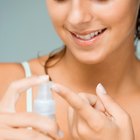
Can Any Over-the-Counter Creams Tighten ...

How to Get Rid of Purple Bags Under the ...

Anti Wrinkle & Toning Cream for African ...

How to Use Strivectin SD

How to Moisturize Dry Hair Caused by ...
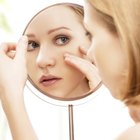
Skin Care Products That Contain ...
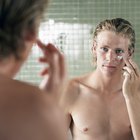
What Is Tretinoin Cream Used For?
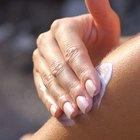
What Cream Is Good for Wrinkled Hands & ...
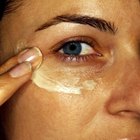
The Best Facial Moisturizers for People ...
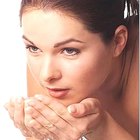
How to Prevent Cheek Wrinkles
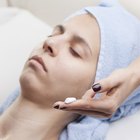
The Best Eye Creams for Eye Bags

How to Repair Nicks in Leather Boots

How to Take Care of Wrinkled Hands

List of Retinoids

How to Get Rid of Eye Bags Using Green ...

Benefits of Shea Butter and Coconut Oil ...
References
Writer Bio
Shelley Moench-Kelly is a writer and editor whose clients range from L'Oreal and www.Makeup.com to the McGraw-Hill Companies and FIDM. She has interviewed notables such as Dr. Andrew Ordon of “The Doctors” and the legendary Vidal Sassoon. Her first book, "Egg," is slated for release in 2016.